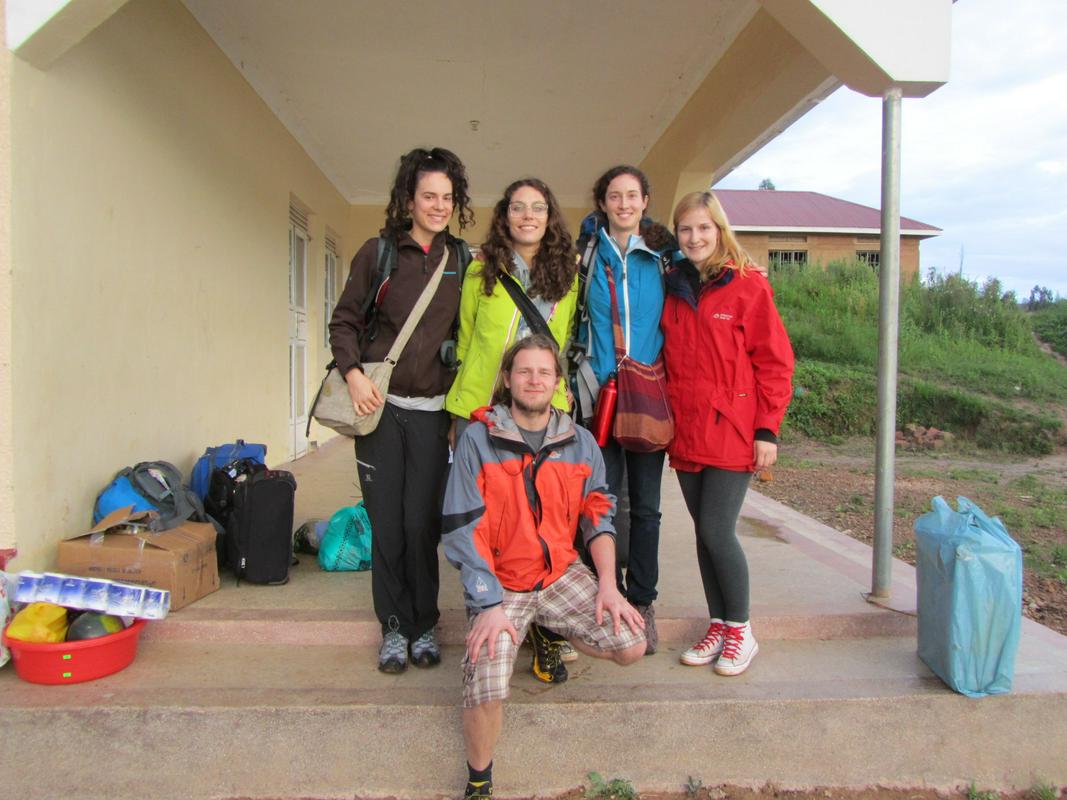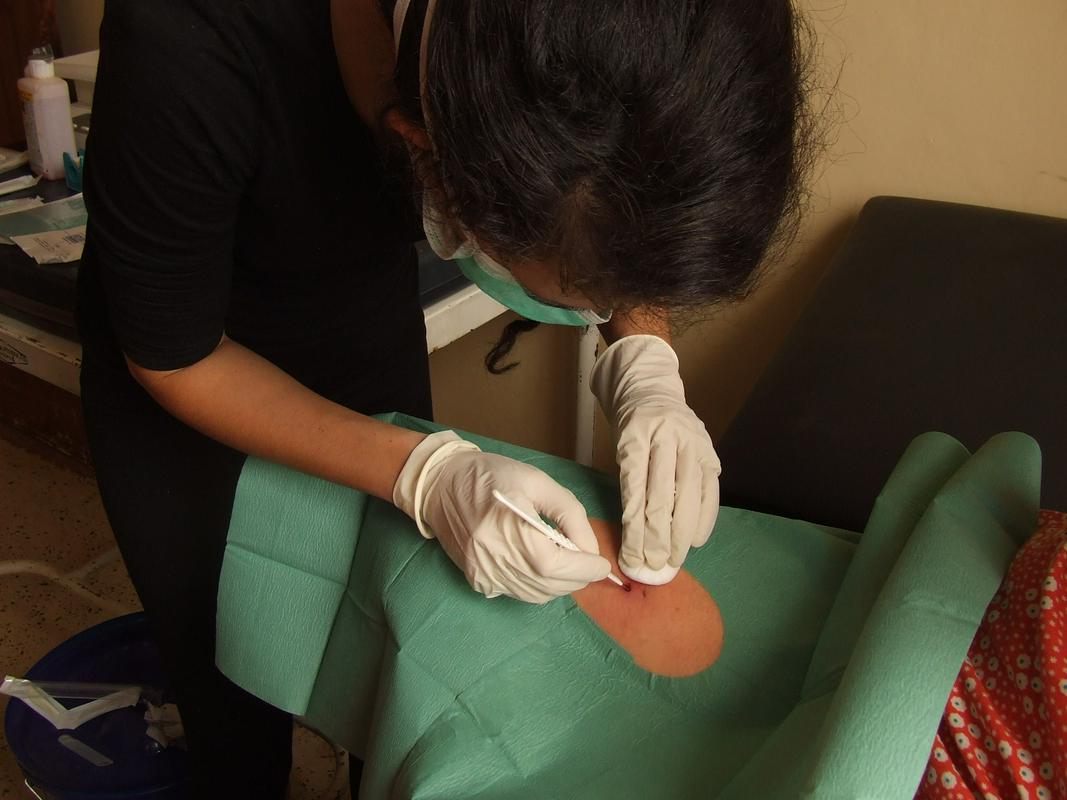
"
Six young doctors and medical students from the Faculty of Medicine, part of the department for tropical diseases within the Clinic for Infectious Diseases at the University Medical Clinic in Ljubljana (apart from Ivona Kruljac also Tina Bizjak, Kati Legat, Diana Vegelj, Vid Gorjan and Iztok Ditz) went to south-west Uganda at the beginning of November, on the island of Bwama located in lake Bunyonyi. For almost three months now they've been dealing with the health problems of the local population, which has no access to basic health care.
The six members of the team offer basic health and dental care, and much needed medicine. They also have a chance to discover the advantages and disadvantages of living in Africa. "If back home we feel we're always running out of time, that's certainly not the case in Uganda. There is a lot of work to do, but the rhythm of life is really calm," says Ivona Kruljac. She adds that it's quite difficult for us westerners, with our own point of view, to see things through the eyes of the locals. "You have to accept the fact that sometimes you can't help a patient, although you're doing all you can. You have to focus on the ones whose pain you can ease, " is what she also said. You can read more about their experience in the interview below.
What does your day look like?
We get up at 8.00, have breakfast at 9.00 and start working. We all live in the same building where we also work (we have separate entrances). At 13.00 we have lunch with our hosts (their cooking is really delicious, although it looks quiet monotonous at first glance; the menu includes potatoes, sweet potatoes, cabbage, beans, rice and peanut butter. Once a week they also serve us crabs from the lake). After lunch we continue working. The clinic closes once we've examined all the patients. The rest of the day is dedicated to home chores, washing clothes, and reading medical literature, when we come across unfamiliar problems during the day. The locals have taught us to how to catch crabs and have supplied us with homemade traps made from palm leaves. You have to leave the traps between reeds which grow near the shore of the lake. After a few days you check the traps and then place them in another location.
At the end of the week, on Saturdays and Sundays, we don't work. We then usually go to Kabala, the closest city, and visit the market, shops, pharmacy and buy all the medicine we need for our work (at the clinic we also have our own pharmacy, which we supply though the funding of our expedition). As we have no shower facilities, we wash ourselves and our clothes in the lake. As the sea is located 1.950 meters above sea level, in bad weather the temperature of the lake can get down to 10C. Sometimes we heat the water and use plastic dishes for washing. We use a mixture of water from the lake and rainwater, which we always have to cook before drinking. We have solar panels for electricity.
How has the local population accepted you? Are they grateful for your help?
The local population has accepted us really well. And they're happy because they can turn to us for free medical assistance. You do have public hospitals in Uganda, but you always have to pay for the medicine. A big majority of the population can't afford that. They're mostly shy and keep back when they make first contact with us "muzungus" (a muzungu is a white man). They're most grateful when they get eyeglasses. As we can't perform diopter measurements, they just put eyeglasses on and try to find the right ones. Interestingly the most appropriate glasses are the usually the ones which look best on the person. If we deal with a patient or pregnant woman in need of hospital care, we organize free transport to the hospital - first by a boat owned by the clinic, and then by taxi. If the patient has to undergo specific medical examinations, which we're not able to provide, we reimburse their costs. However it does sadden us that we get not information about the result of the treatment, as patients often don't come back for a regular check-up. The reasons for this are supposedly of a financial nature (they have no money to take them to the island). Another reason is that when the feel good, they see no need to return.
What about the local medical staff? Do you cooperate with them and do they help you? And how do you overcome language barriers?
A few local health workers are employed at the clinic. There are no doctors among them, but we do have nurses, lab technicians, administrators, a boatman, as well as so-called "clinic officers". Those are health workers with a finished three-year study of health – a kind of short version of studying medicine. They are trained to examine patients and assign therapies. They can also conduct minor medical interventions and help give birth. Their presence at the clinic is questionable. The majority of the population speaks no English so translators are needed. We get a lot of help from the staff at the clinic and the security guard, Ronald, who helps us out in almost everything.
What kind of work are you involved in? As I could see you are both doctors and dentists. What's the most frequent medical task you have to do and are they minor medical interventions or larger operations?
Three doctors, two dentists and one nurse make up our expedition. Our work mostly involves internal medical check-ups on children and adults. We also perform a few surgical tasks, such as tending to open wounds, burns, removing skin formations, mucous and subcutaneous formations, as well as skin worms.
The most frequent problems are caused by bacterial and fungal infections of the skin, inflammations of the eyes and ears, inflammation of the lungs, asthma, pain in the lower abdomen due to sexually transmitted diseases, and the biggest problem, above all – stomach aches. Locals mostly eat only once to twice a day and drink very little or no water at all. Their main drink is a local alcoholic beverage called "bushera". Taken regularly it causes a mucous infection and harms the stomach and intestines. Alcoholism is also a big problem. The dentists also have their hands full, performing both simple and complicated dental extractions. They also treat abscessed teeth and remove benign tumors of the oral cavity.
What about the equipment? Did you bring all you need with you? Health care in Uganda must be very different from what it is here...
We have a laboratory at the clinic in which we're able to perform basic lab tests (we check urine samples with test papers, we do microscopic examinations of the water, urine and different infections, as well as quick tests for the most common contagious diseases such as AIDS, syphilis, brucellosis, malaria and typhoid fever). Every new team that arrives consults with the previous team and brings all the necessary sanitary equipment, needles, injections, bandage material, medical compresses, disinfectants, medical gloves, scalpels for one use only, medical stitches etc. We have to stress that many Slovenian companies and businessmen donated sanitary material, for which we thank them once again.
Bringing medicine from abroad to Uganda is not allowed, so we buy it all here at the local pharmacy. Currently we're not able to perform electrocardiography, ultrasound, x-rays and other diagnostic tests. If we're left with unused funds at the end of our mission, we'll earmark it for the purchase of equipment. It's understood that every expedition that comes here and is left with unused funds, contribute to the purchase of equipment for the clinic. In that way the clinic would become more independent and more successful in its work. We aspire to perform our duties and tasks according to European standards, and to do that you have to be very resourceful at times.
Up to now have you had any bad experience?
At the beginning we were shocked by the state the hospital in Kabala was in. There was very little equipment and the hygiene standards were also very low. That's why the successful treatment of patients is questionable. Many deaths could probably be prevented by following basic antiseptic rules. Everyone with a more complicated illness is in a difficult situation, which can't be solved only with antibiotics. It's always difficult to see a patient you could help in Europe, but has little chances here. You have to accept the fact that sometimes you can't help a patient, although you're doing all you can. You have to focus on the ones whose pain you can ease. Every child whose pain we eased was worth our trip.
However it is difficult to take a step back from our own western-like point of view and try see thing though the eyes of the locals. In reality, those that live around lake Bunyonyi live a nice peaceful life full of songs. There is no real hunger here. Contrary to them many times we focus on things particular systems lack and lose sight of the big picture. It is a fact that many things could be improved in Slovenia's health system, but we also have to be aware of the positive things in our healthcare. The possibilities of making a diagnosis or assigning therapies are quite good, and the quality of work of most professionals is really high.
We have to focus on the things which are positive and encourage them. Of course changes will be necessary, for a system which imposes restrictions on individuals (in this case both on the doctors, which due to certain circumstances are unable to perform their tasks at a satisfactory level, and on the patients, which have the right to quality treatment) is not sustainable. The sentence we hear most often here in Uganda is: "Hello muzungu, how are you?" And even though we're still not used to all the persistent looks we get, staring, and the way children and adults observe us, we are very happy and grateful to have the opportunity to be here and have this experience.


































































